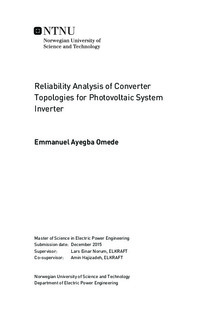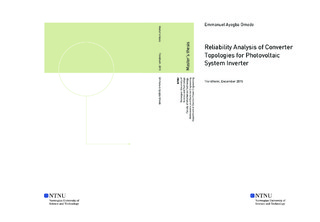| dc.description.abstract | Application of PV systems in distributed generation (DG) and as renewable sources in the power grid are gaining wide acceptance being favoured by rapid technology development, crave for alternative clean energy, environmental protection awareness, favourable energy policies, regulation and incentives. The power conversion stage of PV systems are considered important components for interfacing, transforming and adapting power from PV to end users and as such, the power quality, efficiency and the reliability of PV inverters are key characteristics to prioritize during development. With an assumption that the PV module has almost achieved peak reliability, the PV inverter is analyzed with overall goal to improving the reliability of the PV system. The technology of PV inverters has thus far mainly focused on improving efficiency, power quality, and ensuring safety which has led to emergence of various PV inverter topologies today. This thesis studies the current PV inverter topologies and analyzes the reliability of two transformerless inverter topologies; Flying capacitor (FC) inverter and the modular multilevel converter (MMC) inverter. It aims to assess the reliability performance of both PV inverter topologies in comparative reliability analysis. The scope of this thesis is limited to transformerless grid-connected PV systems for basic assumptions that simplifies reliability analysis.
Current PV inverter topologies have been studied and a set of transformerless multilevel PV inverters was selected based on fundamental market requirements. Suitable reliability analysis methods have been performed for the selected inverter topologies to assess reliability performance. The reliability performance metrics that have been applied for reliability assessment and ranking of the PV inverter topologies are; survival probability of the inverter over 10 years operation, failure rate, mean life of the inverter, complexity of design and inverter operation and level of redundancy.
The study identified the following PV inverter topologies for reliability assessment based on inverter efficiency, power quality, minimum leakage current, and galvanic isolation; 5-level Flying capacitor transformerless multilevel inverter (topology-1) and 5-level transformerless modular multilevel converter (topology-2). The results and performance ranking from comparative reliability assessment showed that topology-2 gives the highest system reliability performance and rank. The main reasons for the difference between the PV inverter topologies are found in the topologies number of critical components, fault tolerant ability and ease with implementation of reliability positive redundancy. | |

